
China Labour Bulletin Report Series on Workers' Movement
On June 12, 2025, the Hong Kong–based NGO China Labour Bulletin (CLB) announced its dissolution. This marks yet another Chinese civil society organization that ceased operations following the implementation of the Hong Kong National Security Law. Founded in 1994, CLB was dedicated to promoting the Chinese labor movement and had long focused on labor rights in China. Headquartered in Hong Kong, its founder Han Dongfang was a workers’ leader during the 1989 Tiananmen Democracy Movement and one of the founders of the Beijing Workers’ Autonomous Federation.
Over the years, China Labour Bulletin published dozens of reports in Chinese and English on China’s labor movement, addressing issues related to migrant workers, food delivery couriers, women workers, child labor, coal mining, and pneumoconiosis, among others. Following the organization’s dissolution, the China Labour Bulletin website was also taken offline.
In response, the China Unofficial Archives website immediately downloaded and preserved 80 Chinese- and English-language reports from the site. The following 15 reports are observation reports on China's workers' movement.

China Labour Bulletin Report Series on Trade Union Reform
On June 12, 2025, the Hong Kong–based NGO China Labour Bulletin (CLB) announced its dissolution. This marks yet another Chinese civil society organization that ceased operations following the implementation of the Hong Kong National Security Law. Founded in 1994, CLB was dedicated to promoting the Chinese labor movement and had long focused on labor rights in China. Headquartered in Hong Kong, its founder Han Dongfang was a workers’ leader during the 1989 Tiananmen Democracy Movement and one of the founders of the Beijing Workers’ Autonomous Federation.
Over the years, China Labour Bulletin published dozens of reports in Chinese and English on China’s labor movement, addressing issues related to migrant workers, food delivery couriers, women workers, child labor, coal mining, and pneumoconiosis, among others. Following the organization’s dissolution, the China Labour Bulletin website was also taken offline.
In response, the China Unofficial Archives website immediately downloaded and preserved 80 Chinese- and English-language reports from the site. The following 18 reports are studies concerning trade union reform in China.

China Labour Bulletin Report Series on Labor Rights Protection in China
On June 12, 2025, the Hong Kong–based NGO China Labour Bulletin (CLB) announced its dissolution. This marks yet another Chinese civil society organization that ceased operations following the implementation of the Hong Kong National Security Law. Founded in 1994, CLB was dedicated to promoting the Chinese labor movement and had long focused on labor rights in China. Headquartered in Hong Kong, its founder Han Dongfang was a workers’ leader during the 1989 Tiananmen Democracy Movement and one of the founders of the Beijing Workers’ Autonomous Federation.
Over the years, China Labour Bulletin published dozens of reports in Chinese and English on China’s labor movement, addressing issues related to migrant workers, food delivery couriers, women workers, child labor, coal mining, and pneumoconiosis, among others. Following the organization’s dissolution, the China Labour Bulletin website was also taken offline.
In response, the China Unofficial Archives website immediately downloaded and preserved 80 Chinese- and English-language reports from the site. The following 26 reports are studies on the labor rights protection in China published between 2004 and 2024, including titles such as “Research Report on China’s Food Delivery Industry,” “Labor Rights in the Construction Industry,” “Healthcare Workers’ Rights Report,” and “Workers’ Rights in the Manufacturing Sector,” among others.
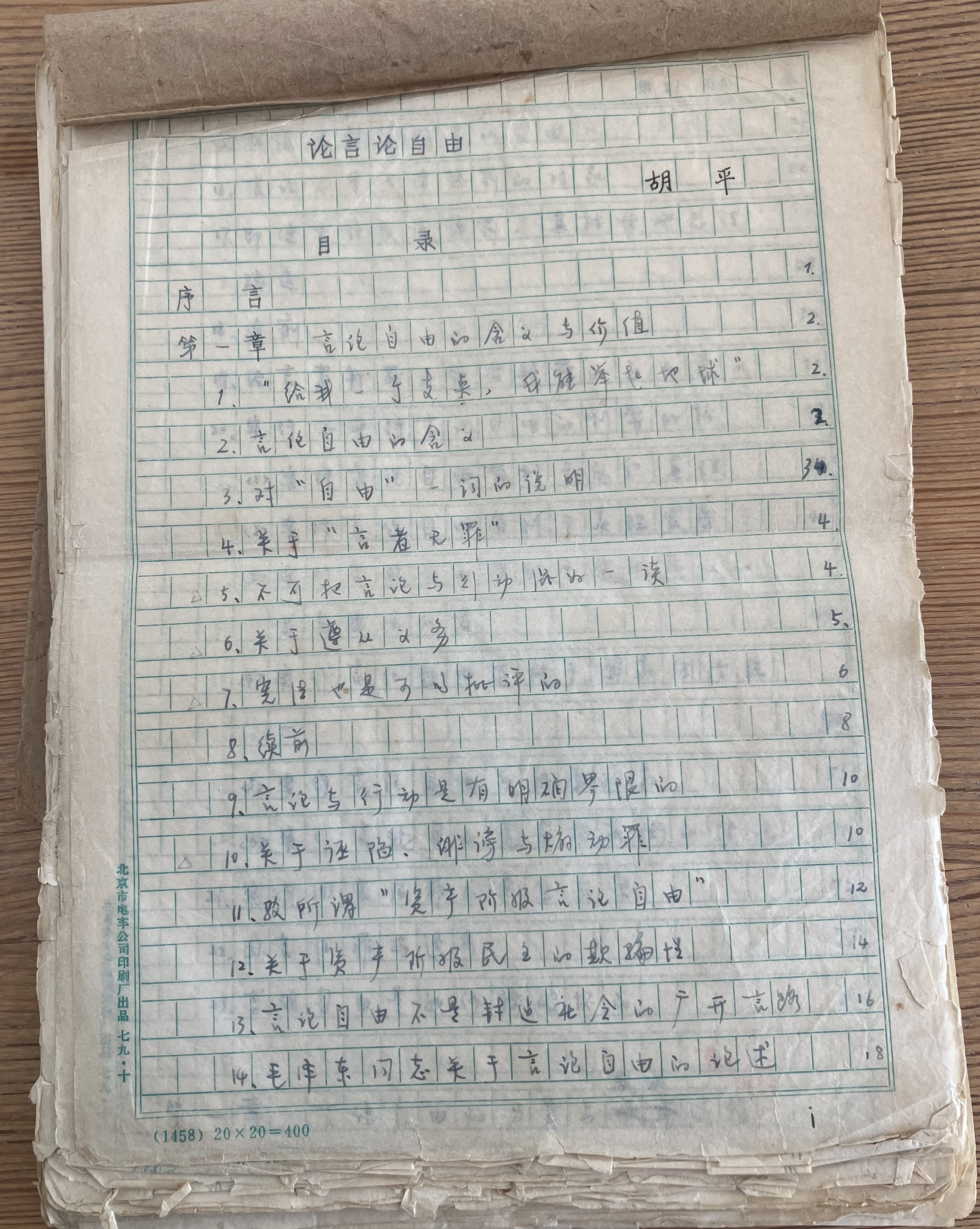
“The yearning for freedom is born from pervasive oppression”—Hu Ping on his 1980s essay, “On Freedom of Speech”
The China Unofficial Archives Interview Series No. 1
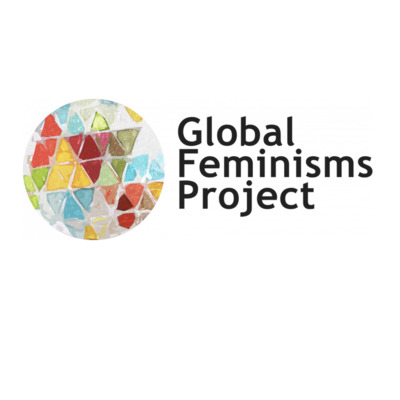
Global Feminisms Project: China Interviews
The Global Feminisms Project, hosted by the University of Michigan, archives oral history interviews with individuals who identify themselves as working on behalf of issues related to women and gender in different national contexts. The goal of the project is to encourage teachers and researchers to study issues related to the many forms of feminist or women’s movement activism in general, as well as activism on behalf of particular issues.
Beyond that, this project is also a useful resource for general readers who are interested in learning more about the history of feminist movements around the world. Interviewees describe their lives, their views, and their activism in considerable detail. The project offers the unedited interviews as primary sources for understanding the history of activism in all its complexity and variation.
The project covers 14 countries, including China, with each having a dedicated site. According to introductions by Wang Zheng, then a professor at University of Michigan’s Institute for Research on Women and Gender, the China Interviews took place in two phases.
In the first, the interviews illustrate the multi-dimensional development of feminist practices in China’s transformation from a socialist state economy to a capitalist market economy from the mid-1980s, when spontaneous women’s activism emerged. Situating such development in the context of both global capitalism and global feminisms, especially in the context of the Fourth UN Conference on Women (FWCW) when Chinese feminists came into direct contact with global feminisms, the interviews, conducted in the early 2000s, explore the cultural, social, and political meanings of Chinese feminist practices. They illustrate how official, non-official, domestic, and overseas Chinese women activists expressed diverse visions of gender equality, even engaging in struggles over the very word “gender.”
These interviews reflect the scope and complexity of the contemporary Chinese women’s movement. Feminist activists include women leaders from diverse groups, such as Ge Youli, who was involved as a young leader in various urban based organizational activities funded by international donors to disseminate feminist ideas; Zhang Lixi, Vice President of the Chinese Women’s College that affiliates with the All-China Women’s Federation, who has promoted women’s studies in her college; Ai Xiaoming, prominent feminist scholar and activist; and Gao Xiaoxian, who holds an official position in the Shaanxi Women’s Federation while creating several women’s organizations outside the official system to engage in legal services for women, anti-domestic violence movements, and issues of gender and development.
In the second phase, five interviews of a younger cohort of Chinese feminists record the rapidly contracted public space for NGO activism in China since the second decade following the FWCW and severe surveillance by the state over feminist activities initiated by autonomous feminist groups and individuals. They also provide powerful testimonies to tremendous creativity, perseverance and courage demonstrated by young feminists who in many cases are making a precarious living in the private sector without much resource for their feminist activism.
<a href=”https://sites.lsa.umich.edu/globalfeminisms/interviews/china/”>The China site</a> provides videos and transcripts of the interviews (both in Chinese and English). In addition to the interviews, the archive also provides maps, statistics, a timeline, podcasts and other resources to assist understanding of the context in which the activists carried out their work.
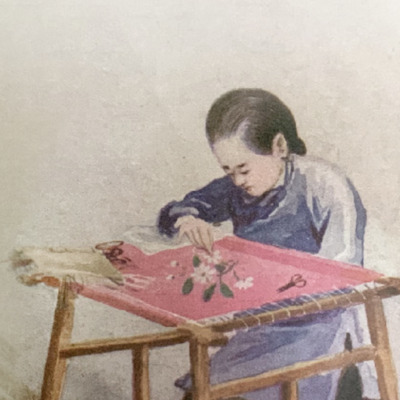
Modern Women Journals Database
This database is part of the “Modern History Databases,” operated by the Institute of Modern History of Academia Sinica in Taiwan. The "Women and Gender History Research Group" of the Institute endeavors to collect, digitize and categorize related books and journals from libraries worldwide, and established the Modern Women Journals Database, which consists of 214 journals and 110,000 individual items. The database has been made available for public use since 2015.
In 1919 and the years that followed, women’s movement in China was on the rise, and as a result, many women's magazines appeared, a lot of which were run by women. Most of the journals collected in this repository were published between 1907-1949, with some published after 1949; there are comprehensive publications, as well as those focusing particularly on women's movements, family, health, employment, etc.; nearly a quarter of the publications were published in Shanghai, followed by Beijing, Guangzhou, and Nanjing. As can be seen from the Database, most of these journals have a relatively short duration, ranging from one to five years. Through this database, readers can gain a more comprehensive understanding of the history of women and women’s movements in modern China.
In addition to browsing journals and searching the database, users can also conduct author research and journal analysis. Under the author research section, users can read author biographies, as well as see the number of articles written by a particular author, and a map displaying their family and social relations. Under the journal research section, users can generate maps by keywords, eras, and article categories, which can provide more multi-dimensional information about a specific era or topic.
Link to the database:https://mhdb.mh.sinica.edu.tw/magazine/web/acwp_index.php. Thanks to the Institute of Modern History, Academia Sinica, for authorizing the CUA to repost.
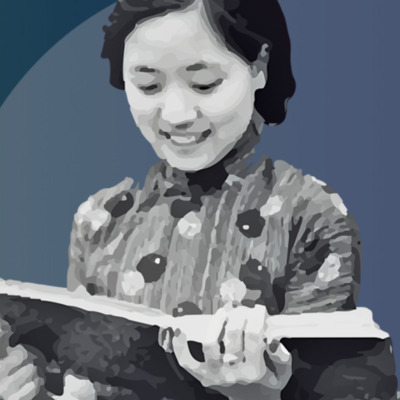
Modern Women’s Biographies Database
The Modern Women’s Biographies Database is part of the Modern History Digital Database of the Institute of Modern History, Academia Sinica, Taiwan. The goal of the database is to create biographical information on women in modern China, in order to counter the dominance of biographies of male figures in modern China history. The database includes biographies of 1,848 women in modern China, a few of whom were not Chinese but were included because they taught at universities in China or Taiwan.
In addition to browsing and searching for biographies, the database provides two additional functions: 1. “Biography Connections”: users can select multiple biographies to generate a map displaying social connections among selected figures; 2. “Place of Origin Map”: a map presenting the places of origin and eras of the figures, and users can click the markers on the map to read the biographies of the figures. By visualizing the biographical information, users can have an overview of the organizational networks of modern women's groups, as well as the development of women's discourse.
Link to the database: https://mhdb.mh.sinica.edu.tw/women_bio/index.php. Thanks to the Institute of Modern History, Academia Sinica, for authorizing the CUA to repost.
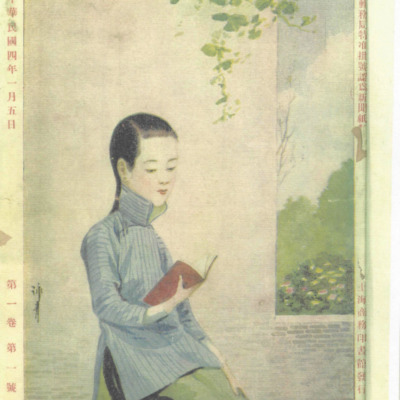
The Ladies Journal
The Ladies Journal was founded in January 1915 by the Commercial Press Shanghai. It was a monthly magazine primarily targeting upper-class women. It ceased publication in 1932 when the Commercial Press was destroyed by Japanese bombing. The magazine was distributed in major cities in China and overseas, such as Singapore. The magazine was considered an influential forum for the dissemination of feminist discourse in modern China, given its long operation and large readership.
The magazine spanned important historical periods such as the May Fourth Movement and the National Revolutionary period, and readers can see how the political environment and social trends influenced the political stance and style of the publication.
Although it was a women's magazine, the chief editors and the authors of most of the articles were men. According to Wang Zheng, Professor Emeritus of Women's and Gender Studies and History at the University of Michigan, the early articles of The Ladies Journal were more conservative. Although it advocated for women’s education, the goal was to train women to be good wives and mothers. Later, under the influence of New Culture Movement and the May Fourth Student Movement, the magazine was forced to reform itself and began to publish debates on women's emancipation as well as to call for more women's contributions, spread liberal feminist ideas, and support women's movements across the country.
1923 saw the beginning of the National Revolutionary period, and the Chinese Communist Party’s nationalist-Marxist discourse on women’s emancipation started to challenge liberal feminism, and the magazine's influence waned. In September 1925, the magazine ceased to be a cutting edge feminist publication after it changed its chief editor again and shifted its focus to ideas more easily accepted by conservative-minded readers,such as women's artistic tastes.
Although the <i>The Ladies Journal</i> was run by men, and some articles displayed contempt for and discrimination against women, it pointed out and discussed many issues that hindered women's social progress, such as lack of education, employment, economic independence, marriage freedom, sexual freedom, family reform, emancipation of slave girls, abolition of the child bride system, abolition of prostitution, and contraceptive birth control. It was also open to many different ideas and views, all of which were published. It is a valuable historical source for the study of women's studies and modern Chinese history.
Yujiro Murata, a professor at the University of Tokyo, founded the The Ladies Journal Research Society in 2000, along with a number of other colleagues interested in women's history from Japan, Taiwan, China, and Korea. The two main goals of the Society are to produce a general catalog of all seventeen volumes of the Magazine and to bring together scholars from all over the world to conduct studies based on the magazine. With the assistance of the Institute of Modern History of Academia Sinica in Taiwan, the magazine was made into an online repository, which is stored on the Institute’s “Modern History Databases” website, and can be accessed by the public.
Link to the database: https://mhdb.mh.sinica.edu.tw/fnzz/index.php. Thanks to the Institute of Modern History, Academia Sinica, for authorizing the CUA to repost.

Wang Yiwei
Wang Yiwei (1905-1993), also known as Wang Naiyi, a native of Minhou, Fujian Province, was a leading Chinese journalist and publisher of women’s publications during the Republican era and early years of the People’s Republic.
Wang attended the Shanghai Girls' Middle School (now Shanghai No. 3 Girls' Middle School), which was run by an American church with the aim of spreading Christianity to Chinese women. However, because she did not accept the teaching style and the fact that most of the students at the school came from rich families, Wang dropped out and completed her studies through self-learning. She then enrolled in China's first co-educational school founded by Feng Yuxiang, a general of the National Revolutionary Army.
After graduation, Wang was first admitted to the Department of History of Nanjing University, and soon transferred to the Department of Journalism at Fudan University, which had begun accepting female students, and she aspired to be the first generation of female journalists in China.
After graduation in 1932, at the invitation of one of her classmates at Fudan University, Wang Yiwei worked as a field reporter for the women's section of the Morning Post, specializing in interviews with prominent women, during which she came to know Liu-Wang Liming, then president of the China Woman’s Christian Temperance Union. They decided to co-found the independent women's publication <i>The Women's Voice</i>, aiming at encouraging women to seek their own liberation as well as the liberation of the nation.
Due to differences of opinion between the two, in 1934 the magazine declared its independence and stopped receiving funding from the China Woman’s Christian Temperance Union. In order to raise funds, Wang Yiwei held charity events and sales, and solicited individual donations through her personal connections and the magazine’s network of supporters.
Because of its left-leaning stance and its sharp criticism of KMT policies, the magazine was severely censored and suppressed by the KMT authorities. According to Wang Yiwei's own account, she heard from a friend that her name was on a government blacklist. In 1935, <i>The Women's Voice</i> had to cease publication.
After the war against Japan broke out, Wang initially worked at the post office, but in order to continue her involvement in the revolution, she resigned and moved to Guangdong, where she was invited by Lu Suying, the director of the Cultural Department of the Women's Association of the Guangdong Provincial Government, to become the editor-in-chief of <i>Guangdong Women</i>. Shortly afterward, the provincial government moved to Guangxi to escape the Japanese army, and Guangdong Women ceased publication. Wang returned to Shanghai and became the editor of the women's section of the <i>Damei Weekly</i>, writing her own articles to encourage women to join the resistance against Japan. Later, the editor-in-chief of the publisher was assassinated by the Japanese and the newspaper was closed down.
After the victory against Japan in 1945, <i>The Women's Voice</i> resumed publication and Wang Yiwei continued to serve as its editor-in-chief. Due to continued persecution by the KMT, the publication eventually ceased operation in 1947 under both political and economic pressure. Wang Yiwei worked as a family teacher for a while. In 1962, she became a member of the Shanghai Research Institute of Culture and History, an honorary research institution with united front purposes established by the CCP to house pre-1949 intellectuals.
In interview with Wang Zheng, Professor Emeritus of Women's and Gender Studies and History at the University of Michigan, in her later years, Wang Yiwei said she was a strong believer in the CCP's ideology, but after CCP took power in 1949, she saw the inconsistency between its words and deeds, and realized that CCP was merely taking advantage of the women's movement.
For more information about the magazine, please see: <a href="http://sites.lsa.umich.edu/wangzheng/wp-content/uploads/sites/948/2024/11/%E7%8E%8B%E4%BC%8A%E8%94%9A-%E6%88%91%E4%B8%8E%E3%80%8A%E5%A5%B3%E5%A3%B0%E3%80%8B-1987.pdf">Wang Yiwei, “Me and the ‘Women's Voice’: A Tribute to March 8 Women's Day”</a> on the website of Wang Zheng, Professor Emeritus of Women's and Gender Studies and History at the University of Michigan.

The Women's Voice
The Women's Voice (Nüsheng), first issued in Shanghai in October 1932, was a bimonthly magazine published by the Women's Voice Society. It was co-founded by then journalist Wang Yiwei and Liu-Wang Liming, then president of the China Woman’s Christian Temperance Union, with part of the funding coming from the Union, and part being raised by Wang through advertisements and sales.
In the first issue of the journal, the magazine’s mission was described as “to seek liberation for the nation and happiness for all women.” The publication included short commentaries on political affairs, essays, literary works, and readers’ letters. Its content was wide-ranging, including many theoretical articles on the women's movement, discussions on women's participation in politics, marriage freedom, and professional development, reports on the situation of female workers, as well as women's lives in other parts of the world. Although <i>The Women's Voice</i> did not have any political affiliations, it identified with socialism and supported the Chinese Communist Party, believing that national liberation was a prerequisite for women's liberation.
Due to differences of opinion between editor-in-chief Wang Yiwei and president Liu-Wang Liming, the magazine declared its independence and was no longer funded by the China Woman’s Christian Temperance Union in 1934. Due to its left-leaning stance and its sharp criticism of Kuomintang policies, the magazine was subjected to severe censorship and suppression by the KMT authorities and was forced to cease publication in 1935.
After the victory over Japan in August 1945, <i>The Women's Voice</i> resumed publication in November and turned into a monthly magazine. In addition to issuing magazines, the editorial board also held several symposiums, such as “Women's Participation in Politics”, “Women's Education”, and “The Way Forward for Female Intellectuals” The magazine started to collaborate with Liu-Wang Liming again and changed its editorial policy to publish only works by women authors. According to Wang Yiwei, in order to maintain the magazine’s independence, they did not receive any political funding, and that most of its funding came from fundraising events and charity sales. Due to continued harassment by the Kuomintang, Liu-Wang Liming was forced to flee to Hong Kong. Eventually, under both political and financial pressure, <i>The Women's Voice</i> ceased publication in 1947.
<i>The Women's Voice</i> magazine is hosted by the <b><a href="https://mhdb.mh.sinica.edu.tw/magazine/web/index.php"> Modern Women Journal Database</a></b>, operated by the Institute of Modern History of Academia Sinica in Taiwan, and is free for users to register and access. The site contains all of the 1932-1935 issues, but most issues after 1945 were lost, thus only three issues are included. Thanks to the Institute of Modern History, Academia Sinica, for authorizing the CUA to repost.
For more information about the magazine, please see: <a href="http://sites.lsa.umich.edu/wangzheng/wp-content/uploads/sites/948/2024/11/%E7%8E%8B%E4%BC%8A%E8%94%9A-%E6%88%91%E4%B8%8E%E3%80%8A%E5%A5%B3%E5%A3%B0%E3%80%8B-1987.pdf"> Wang Yiwei, “Me and the ‘Women's Voice’: A Tribute to March 8 Women's Day”</a> on the website of Wang Zheng, Professor Emeritus of Women's and Gender Studies and History at the University of Michigan.
Note: In 1942, during the war against Japan, with the financial support of the Japanese and the Wang Jingwei regime , another magazine with the name of <i>The Women's Voice</i> was published in Shanghai, imitating the style and design of the original magazine. The magazine, edited by Japanese left-wing writer and feminist Toshiko Sato (also known as Toshiko Tamura, or Zuo Junzhi in Chinese), was the only women's magazine published in the fallen area of Shanghai under Japanese control. The magazine ceased publication in 1948.
According to research by Tu Xiaohua, an associate professor at the School of Journalism at the Communication University of China, although the magazine had long been regarded as a “traitorous” magazine and a tool of Japanese political propaganda, it also served as a platform for the dissemination of left-wing ideology to a certain extent, due to Toshiko's internationalist stance and the involvement of members of underground CCP members. The magazine is also included in the Modern Women Journals Database.
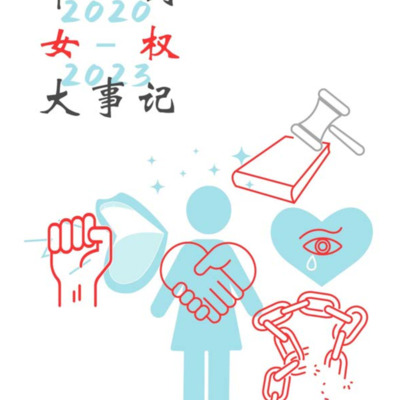
Major Feminist Events in China 2020-2023
This is a record and index of major feminist events in China between 2020 and 2023. The document consists of more than 2,000 pages, in which 122 topics/events related to feminism have been curated. The document is divided into five chapters: “Feminism in the Public Eye ”, “Feminism in Individual Cases”, “Feminism in the Law”, “Feminist Activism,” and “Three Special Years - Feminism amid COVID-19”.
Each event entry is divided into two parts: event summary and related articles The first part aims to provide a complete and objective overview of the event, using first-hand materials when possible; the second part collects media reports and commentaries on the event published through public media outlets and social media platforms.
This document covers a wide range of topics/events, including but not limited to commercial surrogacy, gender discrimination in higher education, China’s population policy and the reproductive rights of women, misogynistic culture in the media, the progress and challenges of the #Metoo movement, legal analysis of law and policies concerning feminist issues, and feminist activism.
The editorial group introduced their intention as follows in the document’s introduction:
“This document, though imperfect, is an attempt to contribute to the writing of the history of Chinese feminism - history is the road we are walking at the moment, and we've come a long way, still searching for answers hidden in the thick fog. ”
“We hope that this document will not only serve as a tool, but also provide the reader with wisdom and strength.”
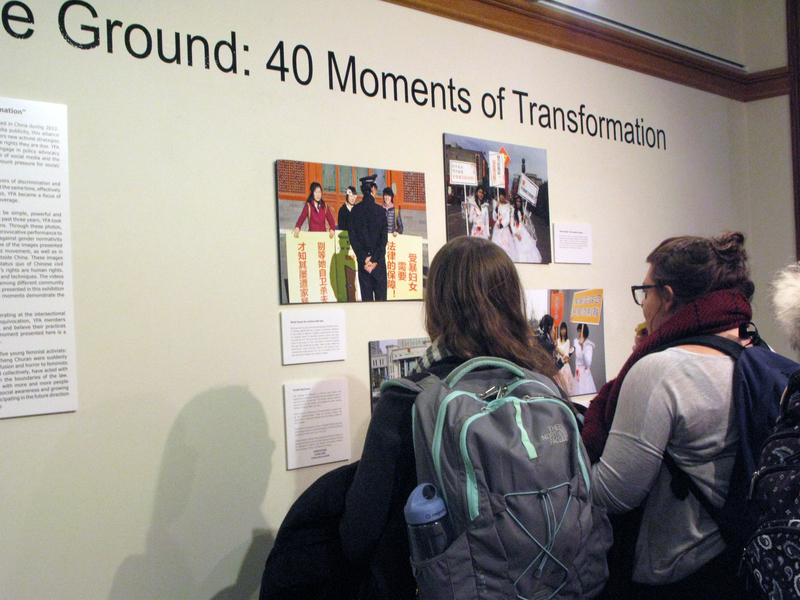
Above Ground: China's Young Feminist Activists and Forty Moments of Transformation (English)
In March 2015, the arrest and detention of five activists in China brought international attention to the feminist movement in that country, which had already been battling gender discrimination, sexual harassment, violence against women, and homophobia for many years. While the West has only recently turned its attention to the “Feminist Five” and their fellow activists, China has a long and deep history of feminist thought and action. This exhibit seeks to make visible the work of recent feminist activists in China, to share their work with a broader audience, and to spark interest in the history and present of feminist activists, advocates, and scholars in China.
This digital exhibit is a faithful representation of a physical exhibit of the same name, which was hosted by the University of Michigan’s Institute for Research on Women and Gender from January through June 2016.
The exhibit (English) consists of 40 images depicting street actions and online campaigns initiated by young feminist activists, raising awareness and demanding government actions around issues of domestic violence, sexual harassment, education and employment equality, rights of sexual minorities and marginalized groups , and so on.
At the opening of the physical exhibit on January 26, 2016, Lü Pin, the curator of the exhibit and a long time feminist activist and researcher, remarked on the creative and subversive strategies of the young feminist activists:
“That’s why this was a story about visibility from the very beginning. First of all, they wanted people to have to notice this issue. Second, they wanted people to have to notice this group of people. ‘Noticing the issue’ was not just about making the issue of women’s rights become well-known, more importantly, it meant that the issue had to be accepted as a public issue that society would acknowledge as something that was very important. This was not something for women, or something private. Next, as we all considered this to be an important matter, the government had to respond. Thus, in this process, communication or media was very crucial, because it could amplify the power of the unknown.”
Using materials from the physical exhibit, this digital exhibit was created by librarians from University of Michigan Liangyu Fu (Chinese Studies) and Meredith Kahn (Women’s Studies), who created additional descriptive information for the images, as well as a bibliography of relevant sources.
Go to Exhibit: https://apps.lib.umich.edu/online-exhibits/exhibits/show/aboveground.

Our Stories: Women in COVID-19 in China
This is the fourth issue of the “Our Stories” series published by WeChat public account “We and Equality,”, a compilation of 20 oral narratives from Chinese people who lived through the COVID-19 pandemic firsthand, and a personal reflection by the author of this issue, Qiao Yilin. The editors hope to “document the history of ordinary people, to combat the forgetting that should never have happened, and to present the real experiences, feelings, and voices of all of us–to help us remember what has happened to us.”
The interviewees in this volume are diverse, including those of different ages, educational background, ethnicities, physical and mental status, sexual orientations,marital status, and mobility. They shared their own memories of the pandemic, including facing threats to their survival due to food shortage, not being able to take anti-depression medication due to the lockdown, international students having a hard time returning to China, people with hearing impairments facing various inconveniences, and the discrimination faced by those who had recovered from COVID-19Although primarily focusing on experiences and feelings during the pandemic, many interviewees shared additional personal stories that provided useful background information for readers to understand their situation during the pandemic.
In addition to these personal narratives, “We and Equality” also published a 44-question “Women's Mental Health Questionnaire” on WeChat, asking about respondents’ experience during the pandemic, including their sense of belonging, care/housework commitments, sleep quality, emotional and mental status, feeling about quarantine, lockdown, illness or death of loved ones, and attitudes towards the government’s COVID-19 policies. The questionnaire received a total of 453 valid responses. Based on the responses, “We and Equality” has compiled a bilingual data analysis report.
”We and Equality" is a grass root project started in November 2016. Through the WeChat public account, they publish articles weekly to raise awareness and share knowledge on gender-related issues in China. They also organize in-person activities bi-weekly where people gather for in-depth discussion, and foster a community to promote gender equality.
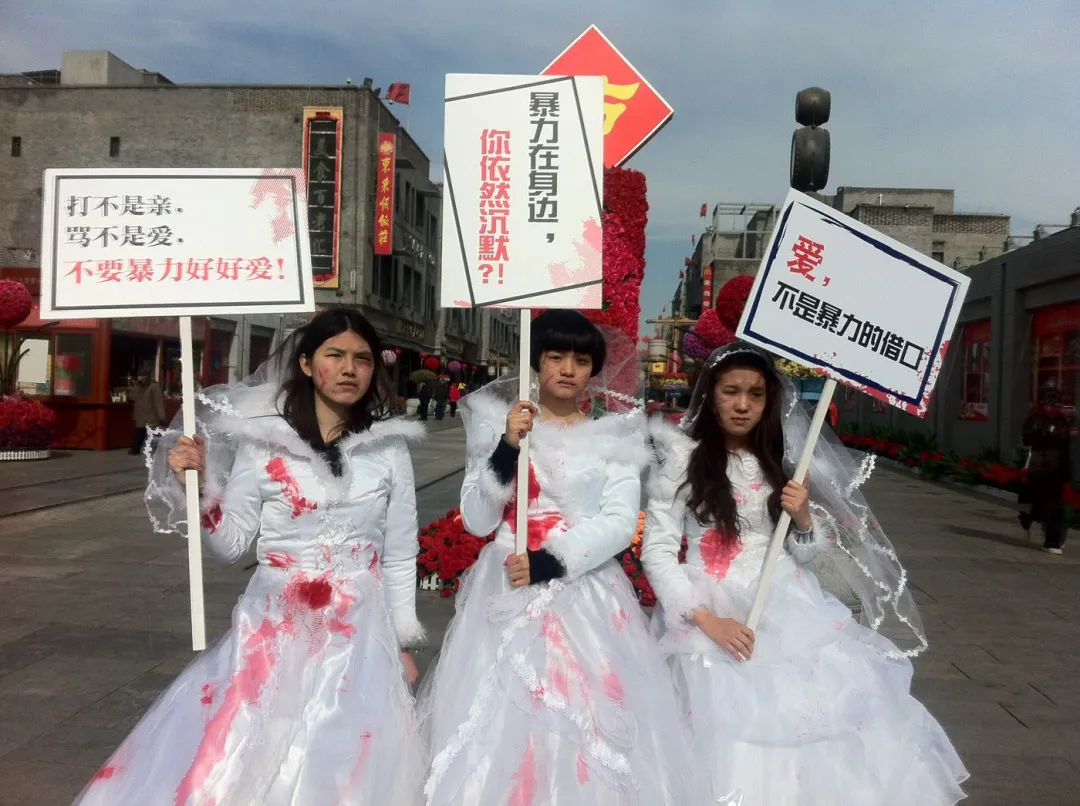
A Brief History of Young Feminists Activism in China
Since 2012, a group known as the “Young Feminist Activists”, has emerged in China. They often use performance art in public to promote gender equality issues; they question injustice, and engage in policy advocacy to advance women’s rights. They make use of social media and the internet to provoke public debate, build public support, and mount pressure for social and self-transformation in China. Their direct actions created new space for activism in China's tightening political environment.
This article provides a detailed overview of the actions initiated by the young feminist activists between 2012 and 2019. These actions cover a wide range of gender issues, including but not limited to sexual assault/harassment, gender-based violence, gender equality in employment and schooling, gender stigma and stereotyping, marriage autonomy, and lesbian rights and interests. These actions have not only raised the public's awareness of gender equality, but also promoted the introduction of gender equality legislation and policies.
A turning point came In 2015 when five young feminist activists were arrested and detained for 37 days for planning to hold an anti-sexual harassment campaign on March 8, Interantional Women's Day. Since then, young feminist activists have almost completely lost their space on the streets. However, as can be seen from this article, feminist activism did not disappear, but sustained and continued in a variety of ways, including the creative use of social media and leveraging transnational solidarity and action.
In the article, the author says, “Young feminist activists should not be forgotten by the public, especially in an environment where censorship has intensified in the past years, civil society has nearly collapsed, and it is extremely difficult for people to speak out. While there is a seeming increase in discussion of feminism in domestic social media, it has been severely depoliticized, feminist activists are marginalized and stigmatized, and their voices silenced. Therefore, it is particularly important to tell the stories of young feminist activists and popularize knowledge about the domestic feminist movement. It is important to let more people see the spirit and achievements of the new generation of Chinese feminists, and understand the important gender issues they have promoted.”
The article is accompanied by numerous images, videos and links to other resources for further reading.

On Freedom of Speech
“On Freedom of Speech” is a treatise by Hu Ping. It was first published in 1979. A revised version was published in 1980, when Hu ran for local elections at Peking University. The treatise was later published in Hong Kong in 1981 and again in a Chinese journal in 1986. Multiple publishing houses in China made plans to distribute the treatise in book form, but China’s anti-liberalization campaign prevented the books from publishing.
“On Freedom of Speech” explains the significance of freedom of speech, refutes misunderstandings and misinterpretations of freedom of speech, and proposes ways to achieve freedom of speech in China.
This document, provided by the author, also includes the content of the symposium held after the publication of “On Freedom of Speech” in 1986, as well as the preface written by the author in 2009 for the Japanese translation of this treatise.
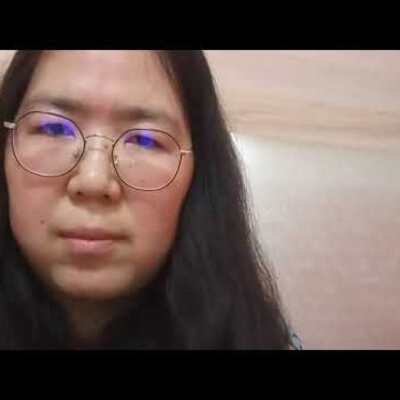
Zhang Zhan Video Series of COVID-19 Outbreak in Wuhan
On 23 January 2020, the Chinese government imposed a lockdown in Wuhan. On February 1, Zhang Zhan took a train from Shanghai to Wuhan. From then until her arrest by the Shanghai police on May 14, Zhang Zhan continued to document the situation in Wuhan on video at the frontline of the pandemic. On February 7, she launched a YouTube channel under her real name and released her first video, “Claiming the Right to Freedom of Expression,” in memory of Dr. Li Wenliang and in solidarity with citizen journalists Chen Qiusi and Fang Bin, who had been taken away for reporting on COVID-19. She said in the video: “If Chinese citizens still do not have the right to freedom of expression,then we are all Li Wenliang." On the same day, Zhang Zhan received a phone call from Shanghai's state security agency threatening to quarantine her if she continued to speak out online, but she did not give in. By the time she was arrested, Zhang Zhan had posted 122 videos on <a href=”https://www.youtube.com/@%E5%BC%A0%E5%B1%95-y3p/featured”>her YouTube channel</a>. In her videos, she traveled around Wuhan at the height of COVID-19, documenting empty streets, the roar of funeral home incinerators late at night, the desperation of patients with no place to turn for medical care, the arbitrary deprivation of residents’ freedom of movement, and the chaotic and hypocritical nature of government policies. These videos show the world the reality of Wuhan in the early days of the outbreak, making thema precious historical record.
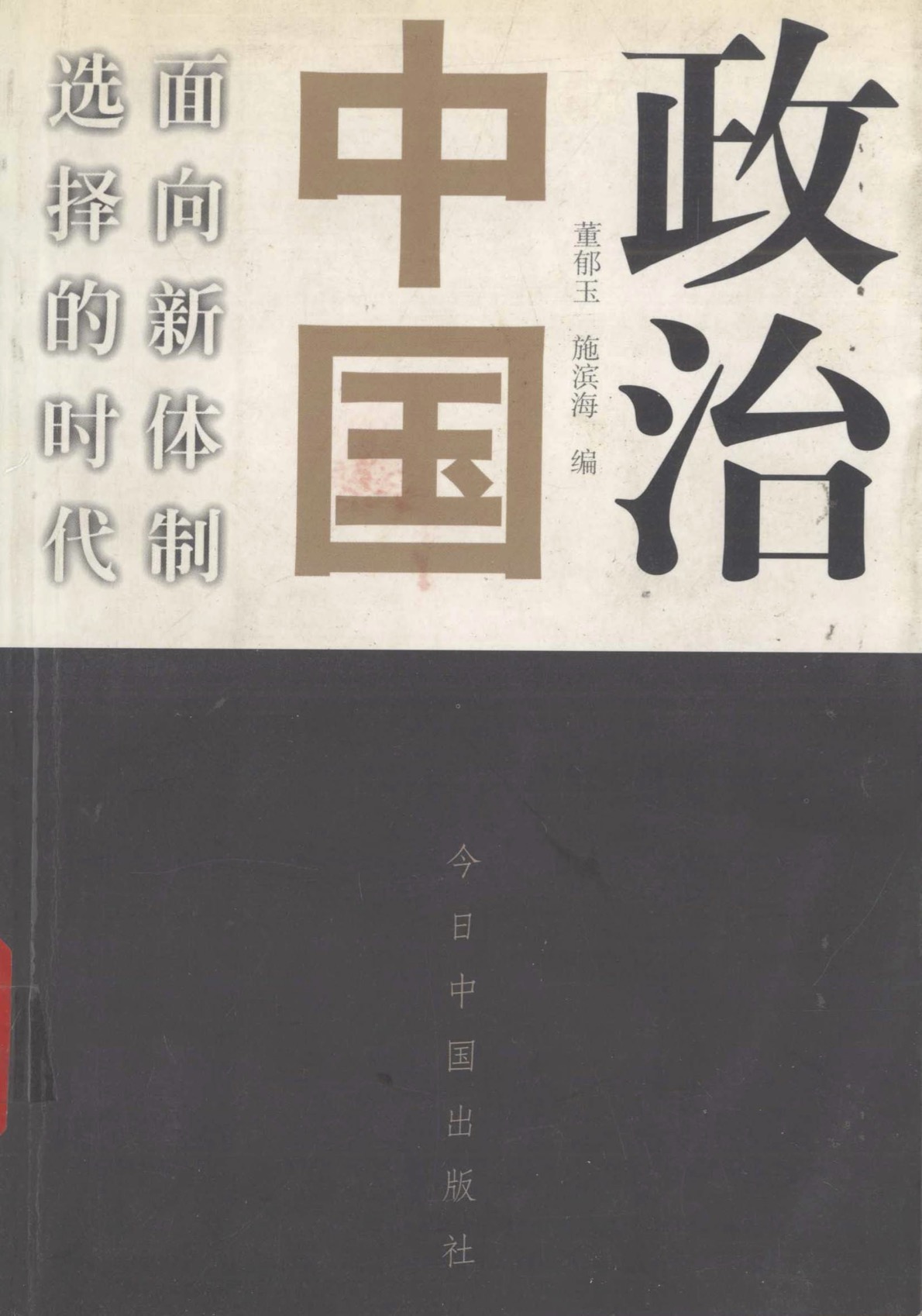
Political China: Towards an Era of Choices for a New System
This book is a collection of writings from the late 1990s regarding political system reform in China. The editors state in the afterword: “This book has collected nearly all, if not all, of the articles discussing political system reform in recent years. From this, we can see the research achievements and level of people’s understanding of political system reform in recent years.”
The articles in the book cover a wide range of topics, from political system reform to democracy, the rule of law, constitutional government, freedom, rights, and economics. Although the articles in the book were all published independently before, Political China was soon banned by the authorities after its publication, and the Today China Publishing House soon shut down under official pressure.
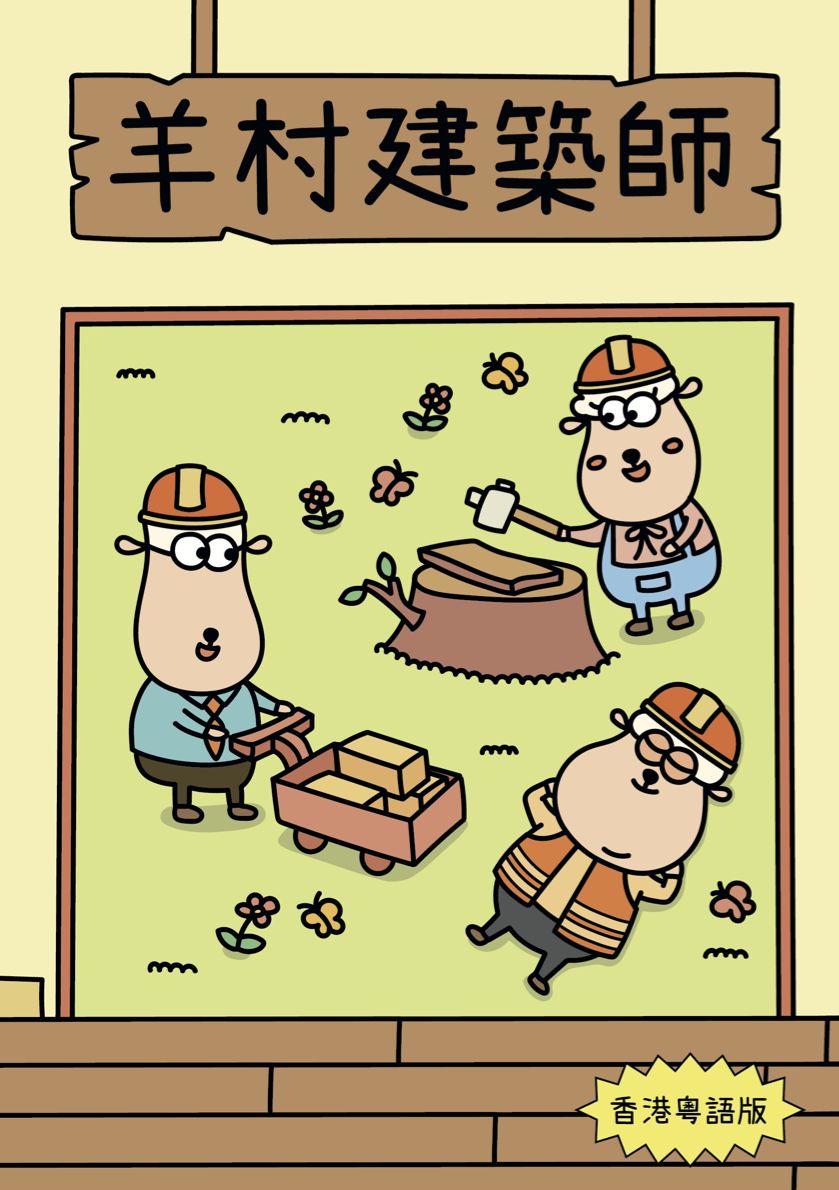
The Architects of Sheep Village (Cantonese and English Versions)
<i>The Architects of Sheep Village</i> is a children’s book in the <i>Sheep Village</i> series. This book describes the building of civil society in Hong Kong and the authorities’ crackdown on Hong Kong’s civil society after the 2019 social movement.
The <i>Sheep Village</i> Series Children’s Picture Books
The <i>Sheep Village</i> series is a group of six children's books published by the General Union of Hong Kong Speech Therapists. The six books are titled <i>The Guardians of Sheep Village</i>, <i>The Twelve Warriors of Sheep Village</i>, <i>The Street Cleaners of Sheep Village</i>, <i>Voting Day in Sheep Village</i>, <i>Sheep Village Daily</i>, and <i>The Architects of Sheep Village</i>.
<i/>The Guardians of Sheep Village</i>, <i>The Twelve Warriors of Sheep Village</i>, and <i>The Street Cleaners of Sheep Village</i> were published in Hong Kong between 2020 and 2021, while the other three were not formally published and were mainly distributed on the Internet.
On July 22, 2021, the national security unit of the Hong Kong Police arrested five board members of the Hong Kong General Union of Speech Therapists, including its president Lai Man Ling and its external vice president Yeung Yat Yee Melody, as well as the union's three other board members, Ng Hau Yi Sydney, Chan Yuen Sum Samuel, and Fong Tsz Ho, on the charge of conspiracy to print, publish, distribute, display and/or reproduce seditious publications. The five defendants were denied bail and remanded in custody for nearly a year before trial. On September 10, 2022, Judge Kwok Wai-kin sentenced the five defendants to 19 months in prison.
The <i>Sheep Village</i> case was the first case involving the charge of conspiracy to print, publish, distribute, display and/or reproduce seditious publications since Hong Kong’s handover in 1997.
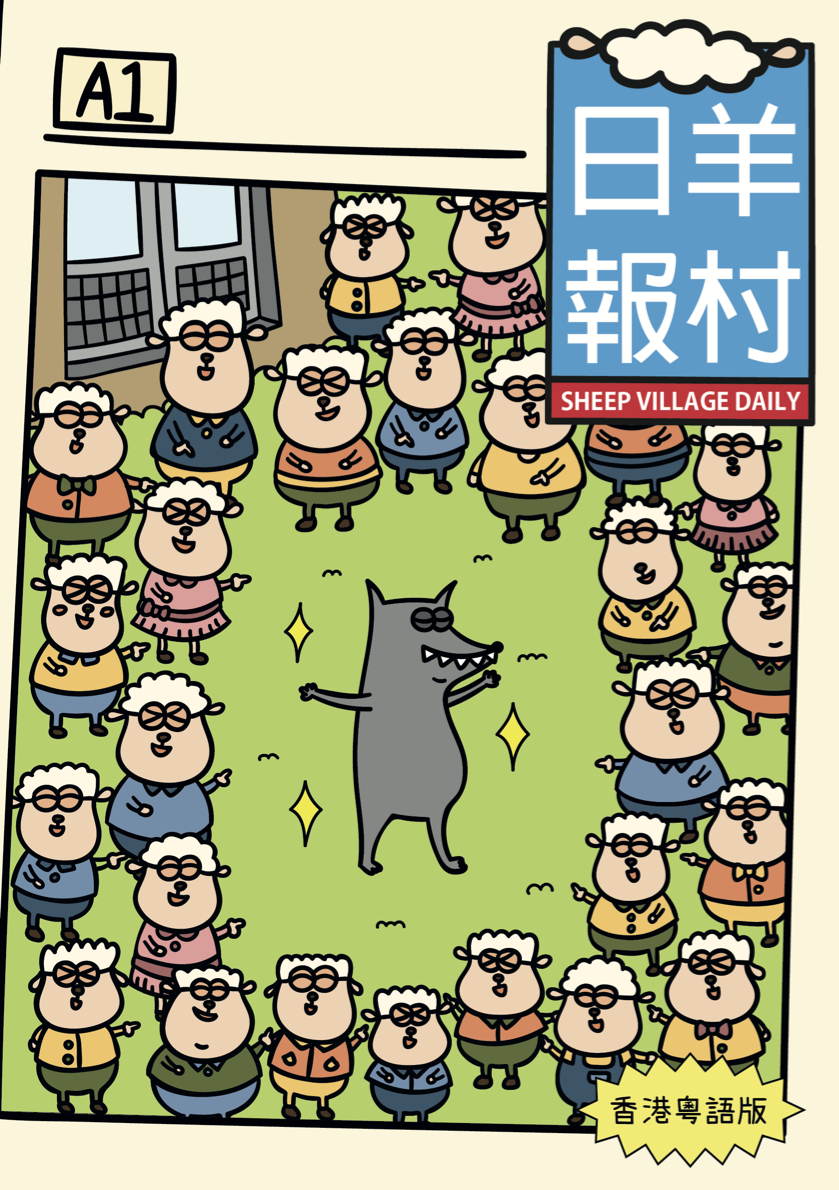
Sheep Village Daily (Cantonese and English Versions)
<i>Sheep Village Daily</i> is a children’s book in the <i>Sheep Village</i> series. This book describes the loss of press freedom in Hong Kong and the forced shutdown of Hong Kong’s <i>Apple Daily</i>.
The <i>Sheep Village</i> Series Children’s Picture Books
The <i>Sheep Village</i> series is a group of six children's books published by the General Union of Hong Kong Speech Therapists. The six books are titled <i>The Guardians of Sheep Village</i>, <i>The Twelve Warriors of Sheep Village</i>, <i>The Street Cleaners of Sheep Village</i>, <i>Voting Day in Sheep Village</i>, <i>Sheep Village Daily</i>, and <i>The Architects of Sheep Village</i>.
<i/>The Guardians of Sheep Village</i>, <i>The Twelve Warriors of Sheep Village</i>, and <i>The Street Cleaners of Sheep Village</i> were published in Hong Kong between 2020 and 2021, while the other three were not formally published and were mainly distributed on the Internet.
On July 22, 2021, the national security unit of the Hong Kong Police arrested five board members of the Hong Kong General Union of Speech Therapists, including its president Lai Man Ling and its external vice president Yeung Yat Yee Melody, as well as the union's three other board members, Ng Hau Yi Sydney, Chan Yuen Sum Samuel, and Fong Tsz Ho, on the charge of conspiracy to print, publish, distribute, display and/or reproduce seditious publications. The five defendants were denied bail and remanded in custody for nearly a year before trial. On September 10, 2022, Judge Kwok Wai-kin sentenced the five defendants to 19 months in prison.
The <i>Sheep Village</i> case was the first case involving the charge of conspiracy to print, publish, distribute, display and/or reproduce seditious publications since Hong Kong’s handover in 1997.
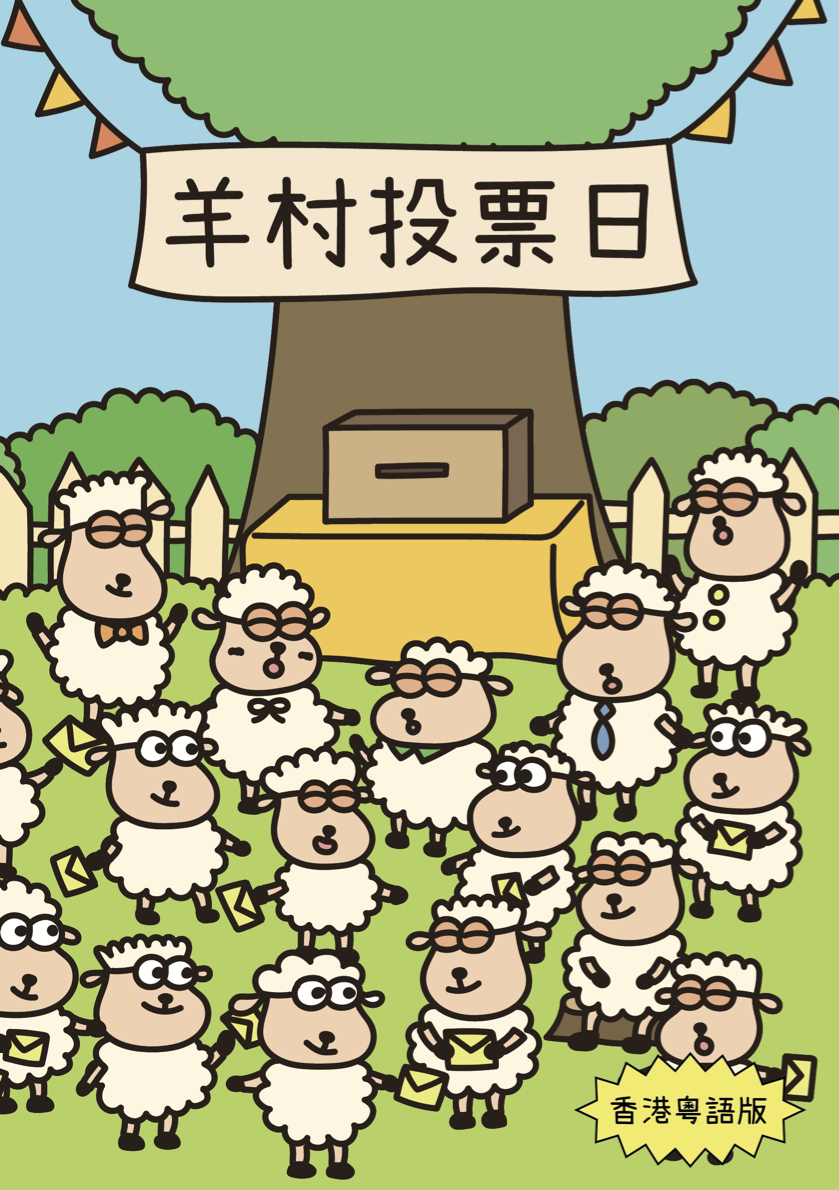
Voting Day in Sheep Village (Cantonese and English Versions)
<i>Voting Day in Sheep Village</i> is a children’s book in the <i>Sheep Village</i> series. This book outlines Hong Kong’s pro-democracy primaries in 2020 and the subsequent jailing of the primaries’ organizers.
The <i>Sheep Village</i> Series Children’s Picture Books
The <i>Sheep Village</i> series is a group of six children's books published by the General Union of Hong Kong Speech Therapists. The six books are titled <i>The Guardians of Sheep Village</i>, <i>The Twelve Warriors of Sheep Village</i>, <i>The Street Cleaners of Sheep Village</i>, <i>Voting Day in Sheep Village</i>, <i>Sheep Village Daily</i>, and <i>The Architects of Sheep Village</i>.
<i/>The Guardians of Sheep Village</i>, <i>The Twelve Warriors of Sheep Village</i>, and <i>The Street Cleaners of Sheep Village</i> were published in Hong Kong between 2020 and 2021, while the other three were not formally published and were mainly distributed on the Internet.
On July 22, 2021, the national security unit of the Hong Kong Police arrested five board members of the Hong Kong General Union of Speech Therapists, including its president Lai Man Ling and its external vice president Yeung Yat Yee Melody, as well as the union's three other board members, Ng Hau Yi Sydney, Chan Yuen Sum Samuel, and Fong Tsz Ho, on the charge of conspiracy to print, publish, distribute, display and/or reproduce seditious publications. The five defendants were denied bail and remanded in custody for nearly a year before trial. On September 10, 2022, Judge Kwok Wai-kin sentenced the five defendants to 19 months in prison.
The <i>Sheep Village</i> case was the first case involving the charge of conspiracy to print, publish, distribute, display and/or reproduce seditious publications since Hong Kong’s handover in 1997.